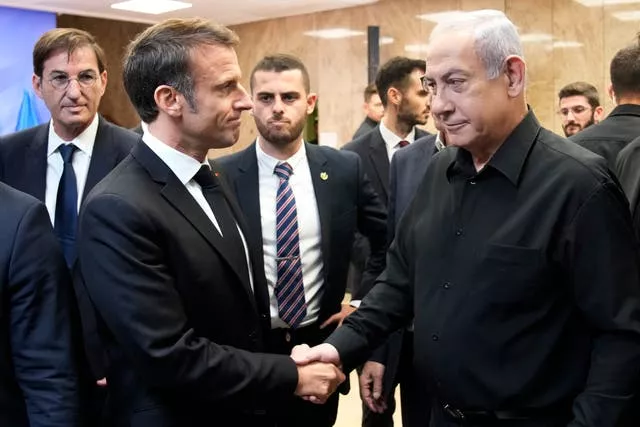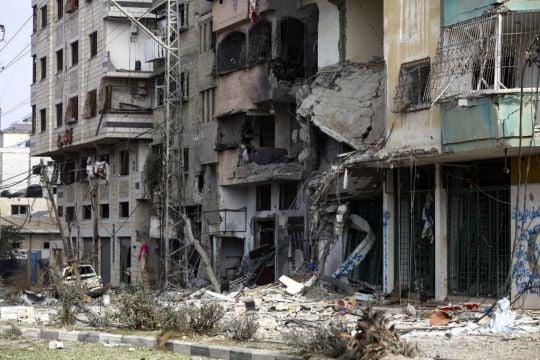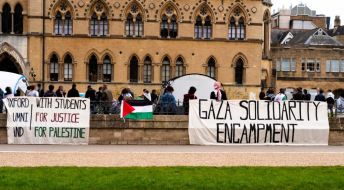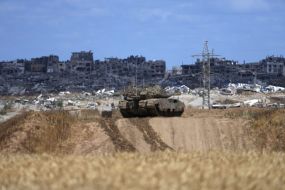Israel has escalated its bombardment of targets in the Gaza Strip, the military said on Tuesday, ahead of an expected ground invasion against Hamas militants that the US fears could spark a wider conflict in the region.
The stepped-up attacks, and the rapidly rising death toll in Gaza, came as Hamas released two elderly Israeli women who were among the hundreds of hostages it captured during its devastating attack on towns in southern Israel on October 7.
Nearly two-thirds of Gaza’s health facilities have ceased functioning amid the increase in Israeli air strikes in the territory, the World Health Organisation (WHO) said on Tuesday.
A total of 46 out of 72 healthcare facilities – including 12 out of 35 hospitals – have stopped functioning across Gaza, the WHO said.
Palestinian health officials said the lack of electricity and fuel to power generators from an Israeli blockade, as well as damage from air strikes, has forced many of the facilities to close.
The Hamas-run Health Ministry in Gaza claimed on Tuesday that Israeli air strikes in the Gaza Strip had killed more than 700 people in the past day.
French President Emmanuel Macron arrived in Tel Aviv on Tuesday, meeting the families of French citizens who were killed or held hostage before heading to talks with top Israeli officials.
He told them that he came “to express our support and solidarity and share your pain” as well as to assure Israel it is “not left alone in the war against terrorism”.
In a joint news conference with Mr Macron, Prime Minister Benjamin Netanyahu said Israel would make every effort to fight the war quickly “but it could be a long war”.
Gaza’s 2.3 million people have been running out of food, water and medicine since Israel sealed off the territory following the attack.
A third small aid convoy entered Gaza on Monday carrying only a tiny fraction of the cargo aid groups say is necessary.

Tamira Alrifai, spokesperson for the UN agency for Palestinian refugees, said the 54 trucks that entered Gaza over the last several days was a “trickle” compared with the 500 trucks a day that entered before the war.
She said UN negotiators were “very, very far away” from getting an agreement to send the sustained aid into Gaza that is needed.
With Israel still barring the entry of fuel, the United Nations said aid distribution would soon grind to a halt when it can no longer fuel trucks inside Gaza.
Hospitals overwhelmed by the wounded are struggling to keep generators running to power lifesaving medical equipment and incubators for premature babies.
On Tuesday, Israel said it had launched 400 air strikes over the past day, killing Hamas commanders, hitting militants as they were preparing to launch rockets into Israel and striking command centres and a Hamas tunnel shaft.

The previous day, Israel reported 320 strikes. The Palestinian official news agency, WAFA, said many of the air strikes hit residential buildings, some of them in southern Gaza where Israel had told civilians to take shelter.
An overnight strike hit a four-storey residential building in the southern city of Khan Younis, killing at least 32 people and wounding scores of others, according to survivors.
The fatalities included 13 from the Saqallah family, said Ammar al-Butta, a relative who survived the air strike. He said there were about 100 people there, including many who had come from Gaza City, which Israel has ordered civilians to evacuate.
“They were sheltering at our home because we thought that our area would be safe. But apparently there is no safe place in Gaza,” he said.
Fifteen members of another family were among at least 33 Palestinians buried on Monday in a shallow, sandy mass grave at a Gaza hospital after being killed in Israeli air strikes.
Israel says it does not target civilians and says Hamas militants are using them as cover for their attacks.

Palestinian militants have fired more than 7,000 rockets at Israel since the start of the war, Israel said, and Hamas said it fired a new barrage on Tuesday morning.
“We continue to attack forcefully in Gaza City and its environs, where Hamas is building up its terrorist infrastructure, where Hamas is arraying its troops,” said Israeli military spokesman Rear Admiral Daniel Hagari. He again told Palestinians to head south “for your personal safety”.
The UN agency for Palestinian refugees said six of its staff were killed in bombings, bringing the number of its workers killed since the war started to 35. The agency said it found shrapnel in two of its facilities from nearby bombings.
The war has killed more than 5,000 Palestinians, including some 2,000 minors and around 1,100 women, the Hamas-run Health Ministry said.
That includes the disputed toll from an explosion at a hospital last week. The toll has climbed rapidly in recent days, with the ministry reporting 436 additional deaths in just the last 24 hours.
The fighting has killed more than 1,400 people in Israel – mostly civilians killed during the initial Hamas attack.

On Monday night, the two freed hostages, 85-year-old Yocheved Lifshitz and 79-year-old Nurit Cooper, were taken out of Gaza at the Rafah crossing into Egypt, where they were put into ambulances, according to footage shown on Egyptian TV.
The women, along with their husbands, were snatched from their homes in the kibbutz of Nir Oz near the Gaza border. Their husbands, aged 83 and 84, were not released.
“While I cannot put into words the relief that she is now safe, I will remain focused on securing the release of my father and all those – some 200 innocent people – who remain hostages in Gaza,” said Ms Lifshitz’s daughter, Sharone Lifschitz.
The women were freed days after an American woman and her teenage daughter. Hamas and other militants in Gaza are believed to have taken roughly 220 people, including an unconfirmed number of foreigners and dual citizens.
Ms Lifschitz, an artist and academic in London who spells her name differently to her parents, told reporters last week that her parents were peace activists, and her father would drive to the Gaza border to take Palestinians to east Jerusalem for medical treatment.
Kindness, she said last week, could somehow save them.

“I grew up, you know, with all these Holocaust stories about how all my uncles’ lives were saved because” of acts of kindness, she said.
“Do I want that to be the story here?” she asked. “Yeah.”
Speaking to reporters, her mother said the militants beat her with sticks, bruising her ribs and making it hard to breathe, as they kidnapped her during the attack on October 7.
They drove her into Gaza, then forced her to walk several miles on wet ground to reach a network of tunnels that looked like a spider’s web, she said.
Ms Lifshitz is one of only four hostages to be released – and the first to speak publicly. She said that after she and four other people were taken into a room, they were treated well, conditions were clean, and they received medical care, including medication. They ate one meal a day of cheese and cucumber, she added.
On Monday, Hamas released a video showing the handover, with militants giving drinks and snacks to the dazed but composed women, and holding their hands as they are walked to Red Cross officials. Just before the video ends, Ms Lifshitz reaches back to shake one militant’s hand.

Around the same time, Israel’s internal security service, Shin Bet, released a recording showing Hamas prisoners — most in clean prison uniforms, but one in a bloody T-shirt and at least one wincing in pain — sitting handcuffed in drab offices talking about the October 7 attack.
The men said they were under orders to kill young men, and kidnap women, children and the elderly, and that they had been promised financial rewards.
The Associated Press could not independently verify either video, and both the hostages and the prisoners could have been acting under duress.
Israel has vowed to destroy Hamas.
Iranian-backed fighters around the region are warning of possible escalation, including the targeting of US forces deployed in the Middle East, if a ground offensive is launched.
The US has told Iranian-backed Hezbollah in Lebanon and other groups not to join the fight.

Israel and Hezbollah have traded fire almost daily across the Israel-Lebanon border, and Israeli warplanes have struck targets in Syria, Lebanon and the occupied West Bank in recent days.
US National Security Council spokesman John Kirby said there has been an uptick in rocket and drone attacks by Iranian-backed militias on US troops in Iraq and Syria, and the US was “deeply concerned about the possibility for any significant escalation” in the coming days.
He said US officials were having “active conversations” with Israeli counterparts about the potential ramifications of escalated military action.
The US advised Israeli officials that delaying a ground offensive would give Washington more time to work with regional mediators on the release of more hostages, according to a US official.
At least 1.4 million Palestinians in Gaza have fled their homes, and nearly 580,000 of them are sheltering in UN-run schools and shelters, the UN said on Monday.







